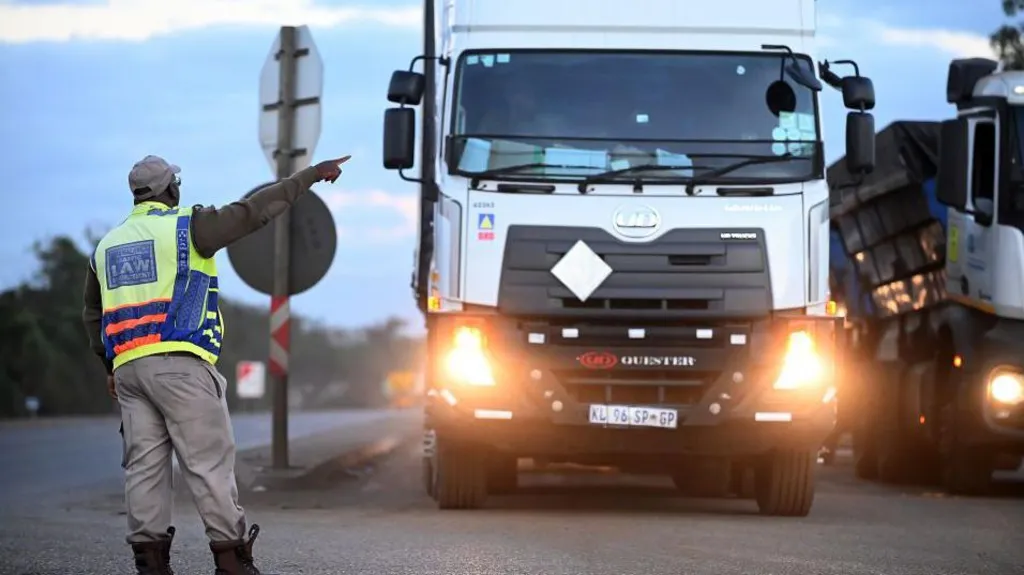South Africa has temporarily shut one of its busiest border crossings with Mozambique due to escalating violence following the country’s disputed presidential election. The Lebombo border post, a critical transit point in southern Africa, was closed for security reasons after violent protests erupted in Mozambique’s cities. The unrest follows the official declaration of the ruling Frelimo party’s candidate, Daniel Chapo, as the winner of last month’s presidential election.
The protests, which began in late October, have sparked deadly clashes, particularly in the capital, Maputo, and surrounding areas. As tensions rise, reports from Mozambique indicate that vehicles have been set on fire at the Lebombo port, prompting South African authorities to close the crossing temporarily for safety. The South African Border Management Authority (BMA) stated that the closure is necessary to ensure public safety, especially as the violence has spread to nearby towns, including Ressano Garcia, which is located near the Lebombo port of entry.
Michael Masiapato, the head of the BMA, confirmed that while the South African side of the border remains unaffected, precautionary measures are being taken. He mentioned that buildings on the Mozambican side have been set alight, and protests have escalated to a point where the situation could spill over. “We are working to secure the Lebombo border and ensure the safety of travelers,” Masiapato said, emphasizing that the closure is in the best interest of both local and international citizens.
Protesters, largely from the opposition, are angry over the results of the election, where Chapo secured over 71% of the vote, while opposition leader Venâncio Mondlane garnered just 20%. Mondlane, fearing for his safety, went into hiding ahead of the official announcement of the results. Human Rights Watch has reported that at least 18 people have died in the violence, with numerous others injured in the ongoing clashes.
The unrest has not only affected the streets of Mozambique but also led to wider societal disruptions. Authorities have restricted internet access and social media to curtail the spread of protest-related information. Despite calls from the government for calm, opposition figures have called for a general strike to protest the election results, further fueling tensions. The strike continues, despite a plea from Mozambique’s prime minister for people to return to work.
On the international front, the situation has prompted action from South Africa, which shares a long border with Mozambique. The closure of the Lebombo border crossing, located about 110 kilometers (68 miles) from Maputo, has affected thousands of travelers and businesses that rely on this critical artery for trade. South African authorities have advised travelers to use alternative crossings until further notice.
While the South African side of the border remains secure, seven Mozambican immigration officers have sought refuge on the South African side, citing safety concerns. This highlights the severity of the unrest, with protests reportedly resulting in the destruction of local government offices on the Mozambican side, including an immigration office.
To prevent the violence from spilling over, the South African police, army, and BMA officials are working together to manage the situation. Authorities have made it clear that they are committed to maintaining peace and order and ensuring the safety of all individuals crossing the border.
In Mozambique, Defense Minister Cristovao Chume has warned that the army may be deployed in response to calls for nationwide protests scheduled for Thursday. Chume accused protestors of attempting to destabilize the country and change the government through unlawful means. He argued that the protests were designed to overturn the results of a “democratically established” election, suggesting a deepening political crisis in the country.
The closure of the Lebombo border post and the heightened security measures reflect the growing instability in Mozambique as the nation grapples with post-election violence. South Africa’s proactive stance aims to prevent the unrest from escalating further, particularly as the two countries maintain close ties both economically and socially. For now, travelers and businesses in the region must navigate the uncertainty created by the protests, with no clear timeline for when the border will reopen.
The situation remains tense, with both governments under increasing pressure to resolve the crisis. For Mozambique, the outcome of this crisis may significantly impact the country’s political future, while for South Africa, the challenge lies in managing both internal security and the safety of its citizens as neighboring unrest continues to unfold.








